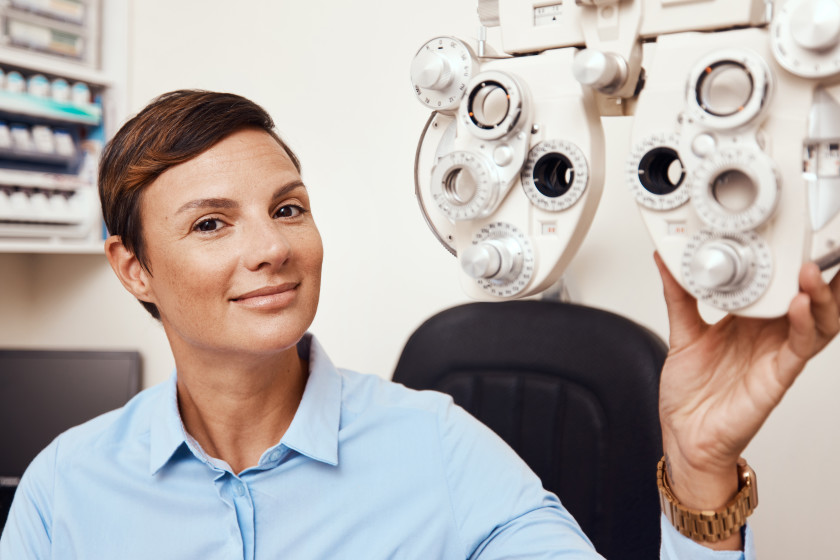Buy One, Get One 50% OFF Eyeglasses
* Restrictions apply. Ask a Team Member for details.

Why Do Eye Doctors Dilate Your Eyes During Your Routine Eye Exam?
Have you ever wondered why your optometrist dilates your eyes during your routine eye exam? Getting your eyes dilated can seem scary, but it’s just done by applying special eye drops. Once your pupils are fully dilated, your eye doctor can better evaluate the overall health of your eye.
Continue reading to learn more about the benefits of pupil dilation from The EyeDoctors.
Factors That Can Increase the Need for Dilated Eye Exams
Some individuals may only need to have their pupils dilated every other eye exam, but some characteristics will increase your need for dilated eye exams.
According to the National Eye Institute, these conditions can range from age to personal risk factors. Always talk with your eye doctor about this, as they can determine what’s best for your eye health.
You will likely need a dilated eye exam every one to two years if you:
Are over the age of 60
Have been diagnosed with diabetes or high blood pressure
Have a family history of glaucoma
Are over 40 and of African American heritage
How Your Pupils are Dilated
A dilated eye exam allows your doctor to better see the inside of your eye through the pupil, which is the black circle in the center of your eye. By dilating or widening the pupil, eye doctors can easily view the complete anatomy of the eye.
Your pupils are dilated with the help of dilating eye drops. Local anesthetic is applied to make the dilation process quick and painless. It takes about 15 to 30 minutes for your pupils to dilate fully.
How are Dilated Pupils Different from Non-Dilated
When not dilated and exposed to light, your pupil will naturally shrink in size. This can make it difficult for the doctor to see into your eye and investigate your eye health in full.
Getting your pupils dilated means that they will not contract when exposed to light. This allows the eye doctor to use a high-powered light and magnifying tool to examine your fully dilated pupil.
How Long Will I Have Dilated Pupils?
Our pupils were designed to naturally adjust to light sources, so you may experience sensitivity to light or blurry vision. It usually takes around 1-2 hours for pupils to return to their normal size.
Important Things to Remember Before Your Pupil Dilation
Before heading to your eye exam, ensure you have a pair of sunglasses on hand. These can help with the light sensitivity you may experience after dilating your eyes. Don’t worry if you forget, as your eye doctor may be able to provide a pair of disposable sunglasses.
Bring your glasses along with you to your eye exam if you wear contacts. Your doctor may not recommend putting your contact lenses on until your eyes are no longer dilated.
You may want to ask a friend or family member to drive you home, as driving with dilated eyes can be dangerous.
The Benefits of Dilated Eye Exams
Getting your pupils dilated aids your eye doctor in detecting harmful eye conditions such as glaucoma or macular degeneration. Additionally, a dilated pupil lets doctors examine your eye for other ocular conditions like retina detachments and tumors.
These eye conditions may appear with or without symptoms, making them difficult to diagnose without the help of a professional.
Staying up to date on your annual eye exams is important for more than just your ocular health – they also help doctors diagnose other health conditions.
An eye doctor can also identify diabetes or high blood pressure through a dilated eye exam.
Schedule a Comprehensive Eye Exam with The EyeDoctors
Keep your routine eye exams routine with The EyeDoctors. Our skilled team of optometrists will work with you to provide preventative eye care and treatment options for diagnosed eye conditions. This will keep your eye health in top shape for years to come.